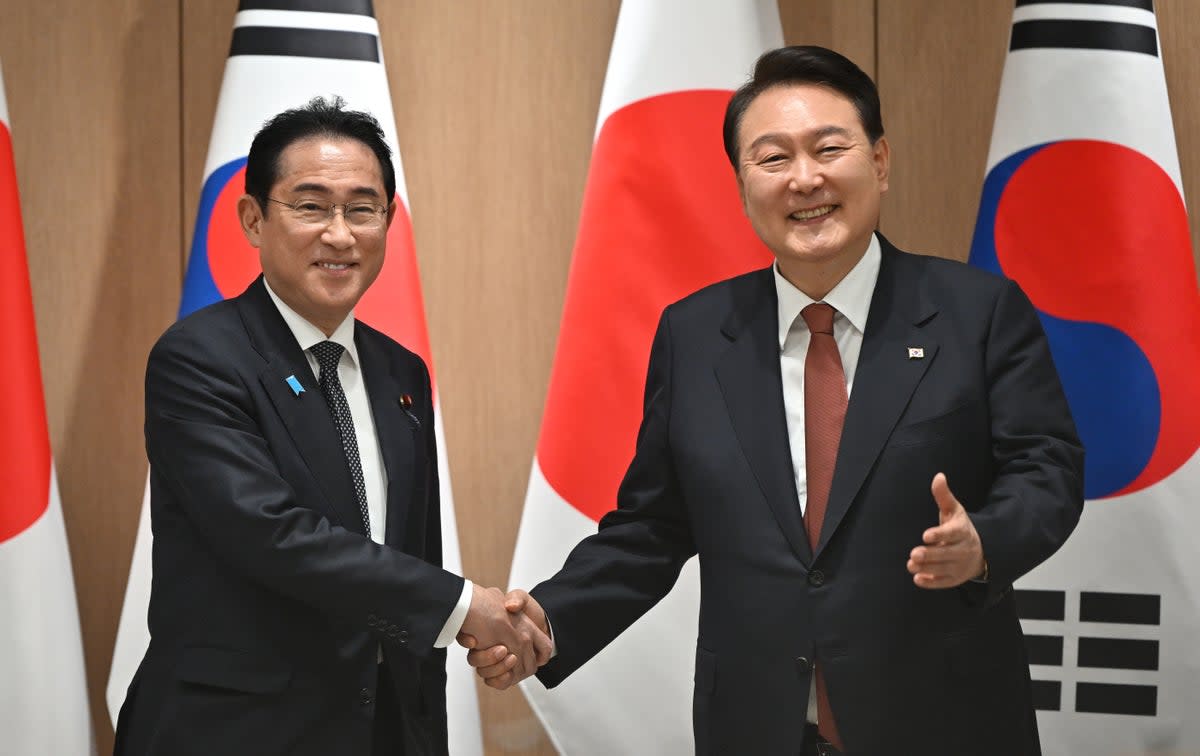South Korea and Japan discuss strengthening ties to contain North Korean aggression

The leaders of South Korea and Japan met for talks on Sunday in which they pushed for closer ties, alongside the US as a shared regional ally, to counter the “serious threat to peace” posed by North Korea.
Japanese prime minister Fumio Kishida arrived in South Korea for a two-day visit to meet president Yoon Suk Yeol, the first visit by a Japanese leader to Seoul in 12 years and the latest step towards a thaw in tensions that date back to their wartime history.
Mr Kishida’s visit, which came on the heels of Mr Yoon’s trip to Tokyo in March, reflects the restoration of “shuttle diplomacy” – regular back-and-forth bilateral visits that ended abruptly in 2011 over historical issues.
“It took 12 years to restore ‘the shuttle diplomacy’ but our exchange of visits took less than two months,” Mr Yoon said at the start of the meeting. “I think this confirms that South Korean-Japan relations, which have started fresh, are moving forward with a speed.”
The two leaders agreed on their “essential” trilateral cooperation involving the US to counter North Korea’s nuclear threats.
“The international situation surrounding us is making cooperation between Japan and South Korea increasingly essential,” Mr Kishida said,
He described North Korea as ”a serious threat to the peace and security not only of South Korea and Japan, but the entire world”.
Mr Yoon reciprocated the feeling by saying he is open to Japan joining a recently agreed to nuclear planning framework with the US to counter Pyongyang.

He added that he feels the responsibility of creating healthy relations in their bilateral ties that are even better than the good times of the past.
Mr Kishida thanked his counterpart for his warm welcome to Seoul, saying he is pleased that the two countries are restoring “shuttle diplomacy” between them.
North Korea, which has ramped up provocations in the Korean peninsula by firing some of its most powerful missiles ever in recent months, was expected to feature high on the agenda as the US is also pushing for greater trilateral cooperation.
The meeting comes after Mr Yoon’s talks with US president Joe Biden in Washington in April, where the two agreed to have US nuclear-armed submarines dock in South Korea under the “Washington Declaration”.
During a joint news conference then, Mr Biden had thanked Mr Yoon “for your political courage and personal commitment to diplomacy with Japan”.

South Korea and Japan recognise cooperation as a way of staying a step ahead of North Korea, said Leif-Eric Easley, a professor at Ewha University in Seoul.
“North Korean provocations and weapons developments are expected soon, so it is important for US allies to stay a step ahead of Pyongyang. They can do so by better coordinating sanctions enforcement, intelligence sharing, missile defence exercises, and anti-submarine drills,” he said.
“Progress on such trilateral cooperation is likely to be highlighted by a Biden-Yoon-Kishida meeting on the sidelines of the G7 summit in Hiroshima later this month.”
South Korea is not part of the G7 but has been invited by Japan as one of eight outreach nations.
The Seoul talks this weekend were also closely watched by South Korean media to see whether the visiting Japanese leader will make a direct apology for Japan’s 1910-45 colonial rule of the Korean peninsula.
An apology would have helped Mr Yoon win greater domestic support for his ties with Japan.
However, Mr Kishida said he upholds the positions of previous Japanese governments including one carried in the landmark 1998 joint declaration by Tokyo and Seoul on improving ties, but didn’t make a new apology.
In the 1998 declaration, then-Japanese prime minister Keizo Obuchi said that: “I feel acute remorse and offer an apology from my heart” over the colonial rule.
Additional reporting by agencies


